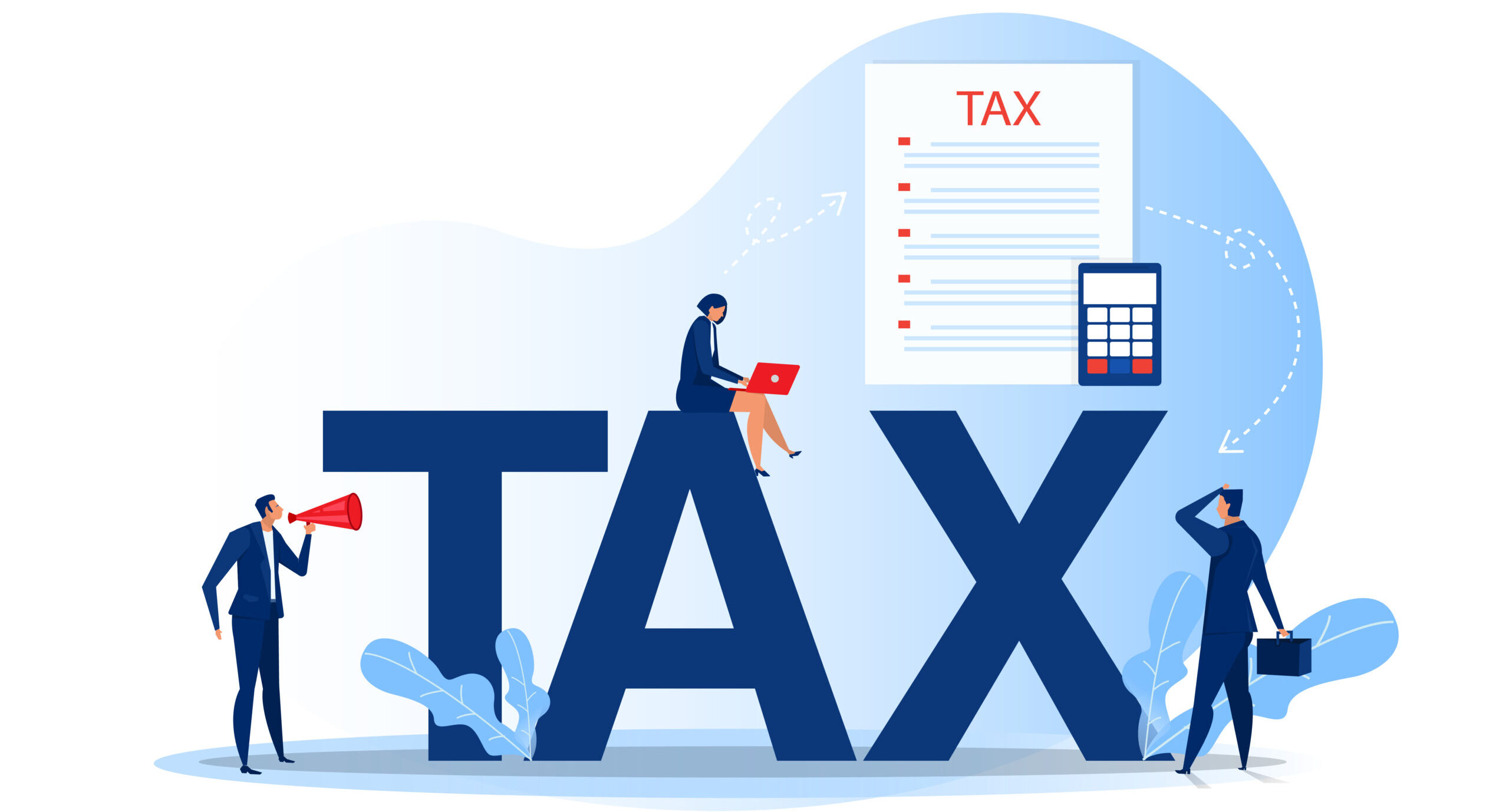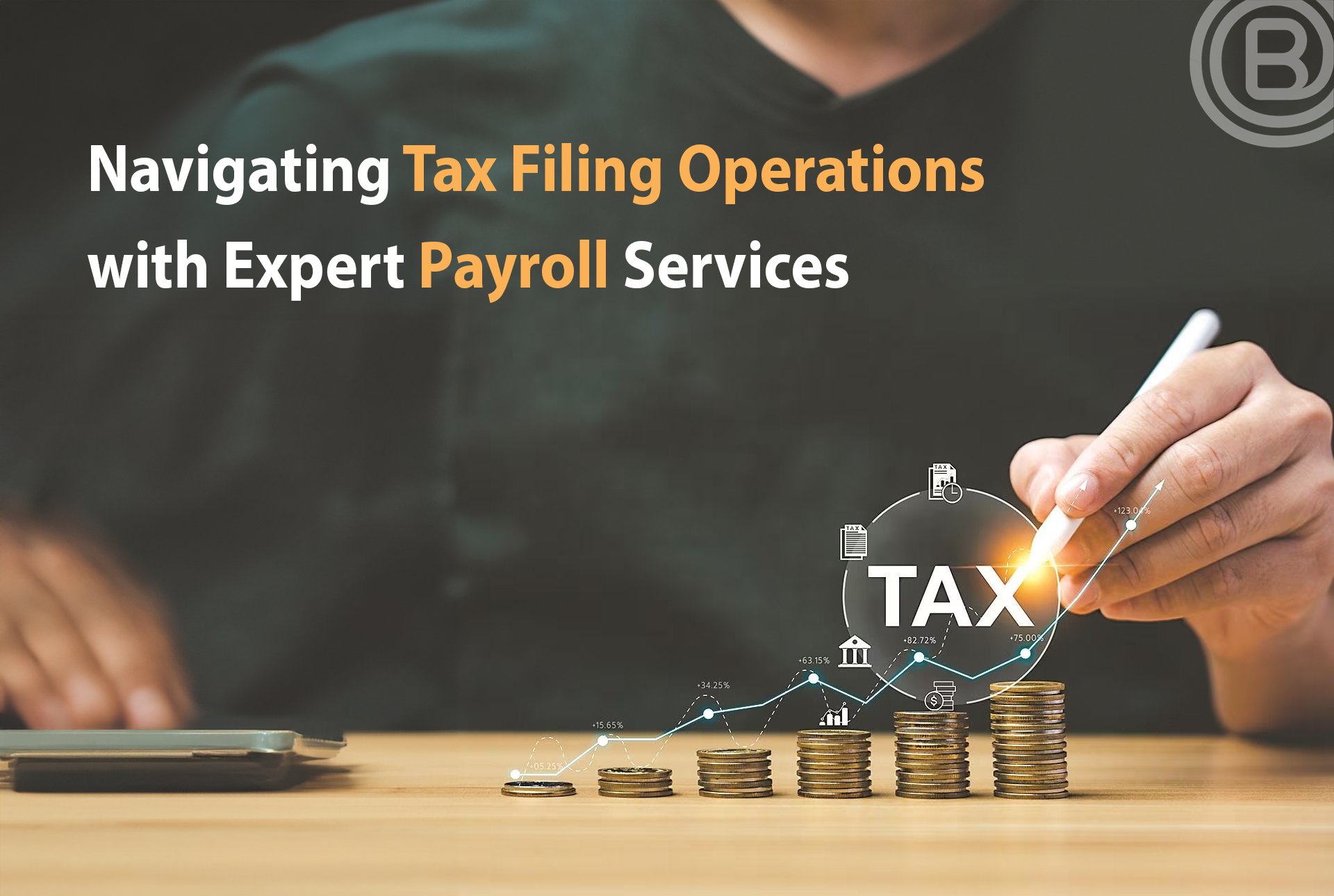Navigating Tax Filing Operations with Expert Payroll Services
- 1 Understanding Tax Filing Operations
- 2 Preparation for Tax Season Readiness
- 3 Leveraging Expert Payroll Services
- 4 Critical Components of Payroll Tax Management
- 5 Ensuring Compliance with Tax Regulations
- 6 Implementation of Payroll Tax Solutions
- 6.1 A. Integrating Expert Payroll Services into Operations
- 6.2 B. Training and Support for Effective Implementation
- 7 Successful Utilization of Expert Payroll Services
- 7.1 A. Streamlining Tax Filing Operations with Payroll Solutions
- 7.2 B. Ensuring Compliance with Expert Payroll Services
- 8 Maximizing Benefits with Expert Payroll Services
Tax filing operations are integral to financial management, encompassing the meticulous preparation and submission of tax returns. Accuracy and compliance are paramount when dealing with income taxes, payroll taxes, or other obligations.
In this landscape, expert payroll services play a crucial role. Tailored to manage payroll-related tasks, these services ensure precision and efficiency in tax calculations, submissions, and documentation. They serve as the cornerstone for seamless tax compliance.
Exploring the impact of expert payroll services in navigating tax filing operations is vital. This examination highlights their pivotal role in facilitating adherence to regulatory standards and optimizing operational efficiency. Businesses and organizations can effectively leverage these insights to streamline their tax filing operations.
Understanding Tax Filing Operations

Tax filing operations are essential components of financial management. This section provides a brief overview of tax compliance and regulations and the pivotal role that payroll taxes play in the tax filing.
A. Overview of Tax Compliance and Regulations
Tax compliance and regulations form the framework within which individuals, businesses, and organizations operate financially. Compliance entails adherence to laws and regulations set forth by governmental bodies regarding the reporting and payment of taxes. These regulations encompass various aspects, including income taxes, sales taxes, payroll taxes, and more, each with its own rules and requirements. Understanding and navigating these regulations are essential for ensuring legal and financial integrity.
B. Role of Payroll Taxes in Tax Filing
Payroll taxes constitute a significant component of tax filing operations, particularly for businesses with employees. These taxes are levied on employers based on the wages and salaries they pay to their employees. The role of payroll taxes in tax filing extends beyond mere collection; it involves accurate calculation, withholding, and remittance to tax authorities. Proper management of payroll taxes is critical for compliance with tax laws and regulations and for fulfilling the financial obligations of the business entity.
Preparation for Tax Season Readiness
Preparing for tax season involves assessing readiness and ensuring efficient payroll tax management.
A. Assessing Tax Filing Readiness
Assessing tax filing readiness involves conducting a comprehensive evaluation of an individual’s or organization’s financial affairs to ensure they are adequately prepared to fulfil their tax obligations. This process entails several vital steps:
- Reviewing Financial Records: Thoroughly examining financial records, including income statements, expense reports, investment statements, and other relevant documents, to ensure accuracy and completeness.
- Gathering Necessary Documentation: Collecting all required documentation for tax filing purposes, such as W-2 forms, 1099 forms, receipts for deductible expenses, and any other supporting documents necessary to substantiate income, deductions, and credits.
- Organizing Financial Information: Organizing financial information in a systematic and accessible manner to facilitate the tax preparation process and minimize the risk of errors or omissions.
- Assessing Tax Liabilities: Calculating estimated tax liabilities based on income, deductions, credits, and other relevant factors to ensure sufficient funds are set aside for tax payments.
- It is identifying Potential Tax Deductions and Credits: Identifying potential deductions and credits that may reduce tax liabilities and maximize tax savings, such as charitable contributions, business expenses, education expenses, and retirement contributions.
- Reviewing Tax Filing Deadlines: Familiarizing oneself with relevant tax filing deadlines is essential to ensure the timely submission of tax returns and avoid penalties or late fees.
B. Importance of Efficient Payroll Tax Management
Efficient payroll tax management ensures smooth tax season readiness, particularly for businesses with employees. This entails effectively managing payroll-related tasks, including:
- Accurate Calculation of Payroll Taxes: Calculate payroll taxes accurately based on applicable tax rates, employee wages, and withholding allowances to ensure compliance with tax laws and regulations.
- Timely Withholding and Remittance: Withholding payroll taxes from employee wages and remitting them to the appropriate tax authorities within designated deadlines to avoid penalties or fines.
- Compliance with Tax Reporting Requirements: Ensuring compliance with tax reporting requirements by accurately reporting payroll taxes on required forms, such as Form 941 for federal taxes and state-specific tax forms.
- Documentation and Recordkeeping: Maintaining detailed records of payroll transactions, tax withholdings, and remittances to substantiate compliance with tax laws and regulations and facilitate tax audits or inquiries.
Leveraging Expert Payroll Services
A. Expertise in Tax Filing Services
- Skilled Professionals: Expert payroll services employ highly trained professionals with in-depth knowledge of tax laws and regulations. These professionals possess extensive experience in tax filing operations, enabling them to navigate complexities effectively.
- Compliance Assurance: By leveraging expert payroll services, businesses ensure that their tax returns are prepared accurately and strictly adhere to legal requirements. These services conduct thorough reviews to verify compliance with tax laws and regulations, minimizing the risk of errors or omissions.
- Optimization Strategies: Expert payroll services go beyond mere compliance and actively seek opportunities to optimize tax strategies for their clients. They analyze financial data to identify potential deductions, credits, and tax-saving opportunities, thereby minimizing tax liabilities and maximizing returns.
- Up-to-date Knowledge: Keeping abreast of tax laws and regulations changes is essential for ensuring compliance. Expert payroll services stay updated on the latest developments in tax legislation, ensuring that their clients’ tax filings remain compliant and up-to-date with current regulations.
B. Payroll Tax Compliance Solutions
- Accurate Calculation: Expert payroll services ensure precise calculation of payroll taxes based on current tax rates, allowances, and thresholds. They utilize advanced software and tools to perform accurate calculations, minimizing the risk of errors.
- Timely Withholding: Withholding the correct amounts from employee wages is crucial for payroll tax compliance. Expert payroll services ensure that taxes are withheld by federal, state, and local regulations, avoiding underpayment or overpayment issues.
- Prompt Remittance: Timely remittance of payroll taxes to relevant tax authorities is essential for avoiding penalties and interest charges. Expert payroll services manage tax payments efficiently, ensuring that taxes are remitted promptly to meet filing deadlines.
- Comprehensive Documentation: Proper documentation is vital for payroll tax compliance. Expert payroll services maintain detailed records of payroll transactions, tax withholdings, and payments, ensuring complete documentation for tax reporting purposes.
- Error Prevention: Minimizing the risk of errors and penalties associated with non-compliance is a crucial focus of expert payroll services. They implement rigorous quality control measures to identify and rectify errors before tax filings are submitted, reducing the likelihood of compliance issues.
- Focus on Core Operations: By outsourcing payroll tax compliance to expert services, businesses can focus on their core operations without the burden of managing complex tax-related tasks. This allows them to allocate resources more efficiently and drive business growth.
Critical Components of Payroll Tax Management

Efficient management of these critical components is essential for ensuring compliance with payroll tax obligations, minimizing risks, and maintaining the integrity and accuracy of payroll operations.
A. Tax Reporting and Documentation
Tax reporting and documentation are essential aspects of payroll tax management, encompassing the following components:
- Accurate Reporting: Ensuring precise reporting of payroll taxes on relevant tax forms, such as Form 941 for federal taxes and state-specific tax forms, by regulatory requirements.
- Timely Submission: Submitting payroll tax reports and documentation to the appropriate tax authorities within designated deadlines to avoid penalties or fines for late filing.
- Documentation Compliance: Maintaining comprehensive documentation of payroll tax transactions, including records of employee wages, tax withholdings, and remittances, to substantiate compliance with tax laws and regulations.
- Recordkeeping Practices: Implementing effective recordkeeping practices to organize and retain payroll tax documents and records in an accessible and secure manner for future reference, audits, or inquiries.
B. Efficient Payroll Deductions Management
Efficient payroll deduction management is critical for accurately calculating and withholding taxes from employee wages, ensuring compliance with tax laws and regulations, and facilitating smooth payroll processing. This involves:
- Understanding Tax Withholding Requirements: Familiarizing oneself with federal, state, and local tax withholding requirements, including income taxes, Social Security taxes, Medicare taxes, and other applicable taxes.
- Employee Withholding Calculations: Calculating employee tax withholdings accurately based on filing status, withholding allowances, and taxable wages by IRS guidelines and withholding tables.
- Benefits and Deductions Processing: Managing employee benefits, deductions, and contributions, such as retirement plan contributions, health insurance premiums, and garnishments, and ensuring accurate withholding and reporting of these amounts.
- Compliance with Wage Garnishment Orders: Complying with wage garnishment orders issued by courts or government agencies by withholding and remitting specified amounts from employee wages to satisfy outstanding debts or obligations.
- Communication with Employees: Provide clear and transparent communication to employees regarding their payroll deductions, including the purpose, amount, and timing of deductions, to ensure understanding and compliance.
- Technology Integration: Leveraging payroll software or technology solutions to automate payroll deduction management processes, streamline calculations, and minimize errors or discrepancies.
Ensuring Compliance with Tax Regulations
A. Navigating Complex Tax Regulations
Navigating complex tax regulations requires a comprehensive understanding of applicable laws and regulations at the federal, state, and local levels. This involves:
- Continuous Education: Staying informed about changes in tax laws and regulations through ongoing education, training programs, and professional development opportunities.
- Regulatory Research: Conduct thorough research and analysis to interpret and understand complex tax regulations, including consulting authoritative sources such as IRS publications, tax code provisions, and regulatory guidance.
- Compliance Assessment: Assessing the impact of tax regulations on business operations, financial transactions, and compliance obligations to identify risk areas and ensure adherence to legal requirements.
- Professional Guidance: Seeking guidance from tax experts, legal counsel, or certified public accountants (CPAs) with specialized knowledge and expertise in tax law to navigate complex regulatory issues and mitigate compliance risks.
B. Strategies for Ensuring Payroll Tax Compliance
Implementing effective strategies for ensuring payroll tax compliance is essential for businesses to meet their tax obligations accurately and timely. Key strategies include:
- Robust Internal Controls: Establishing strong internal controls and procedures for payroll processing, tax withholding, reporting, and remittance to mitigate the risk of errors, fraud, and non-compliance.
- Regular Compliance Audits: Conduct regular compliance audits of payroll tax processes, procedures, and documentation to identify and address any discrepancies, errors, or areas of non-compliance proactively.
- Employee Training and Education: Providing comprehensive training and education to payroll staff and employees on tax compliance requirements, reporting obligations, and proper documentation practices to ensure understanding and adherence.
- Utilization of Technology: Leveraging payroll software and technology solutions to automate tax calculations, withholdings, and reporting processes, minimize manual errors, and streamline compliance efforts.
- Collaboration with Tax Professionals: Collaborating with tax professionals, such as CPAs or advisors, to review payroll tax processes, address compliance issues, and ensure alignment with regulatory requirements.
- Regular Updates and Monitoring: Monitoring changes to tax laws and regulations and reporting requirements regularly, and implementing updates or adjustments to payroll tax processes and procedures accordingly to maintain compliance.
By employing these strategies, businesses can navigate complex tax regulations effectively, minimize compliance risks, and ensure accuracy and integrity in payroll tax compliance efforts.
Implementation of Payroll Tax Solutions

A. Integrating Expert Payroll Services into Operations
Integrating expert payroll services into operations involves strategically incorporating specialized payroll solutions to optimize tax compliance and operational efficiency. Critical steps in this process include:
- Needs Assessment: Conduct a comprehensive assessment of the organization’s payroll processing requirements, compliance challenges, and objectives to identify areas where expert payroll services can add value.
- Vendor Selection: Evaluating and selecting a reputable and reliable payroll service provider with expertise in tax compliance, technology capabilities, and industry experience aligned with the organization’s needs and goals.
- System Integration: Integrating the selected payroll solution seamlessly into existing operational systems, software platforms, and workflows to ensure compatibility, data accuracy, and efficiency.
- Customization and Configuration: Customizing and configuring the payroll solution to align with the organization’s specific payroll processing requirements, tax obligations, reporting needs, and compliance standards.
- Training and Onboarding: Providing comprehensive training and onboarding programs for staff members responsible for payroll processing, tax reporting, and compliance management to ensure proficiency in utilizing the new payroll solution effectively.
- Testing and Validation: Conduct thorough testing and validation of the integrated payroll solution to identify and address any technical issues, data discrepancies, or functionality gaps before full implementation.
- Continuous Monitoring and Optimization: Continuously monitor and optimize the performance of the payroll solution, leverage feedback from users, analyze data insights, and make necessary adjustments to improve efficiency, accuracy, and compliance.
B. Training and Support for Effective Implementation
Effective implementation of payroll tax solutions relies on robust training and ongoing support to empower staff members with the knowledge, skills, and resources needed to leverage the solution effectively. Critical components of training and support include:
- Comprehensive Training Programs: Developing and delivering comprehensive training programs tailored to the specific needs and roles of staff members involved in payroll processing, tax compliance, and reporting.
- Hands-On Workshops and Demonstrations: Conducting hands-on workshops, demonstrations, and practical exercises to provide staff members with practical experience in using the payroll solution and navigating tax compliance requirements.
- Access to Resources and Documentation: Access to user manuals, training materials, online resources, and documentation to support staff members in troubleshooting issues, accessing information, and mastering the payroll solution.
- Dedicated Support Channels: Establishing dedicated support channels, such as help desks, hotlines, and online forums, staffed by experts who can provide timely assistance, guidance, and resolution to payroll-related inquiries and issues.
- Ongoing Education and Updates: Offering ongoing education and updates on tax laws, regulations, and payroll best practices to keep staff members informed, engaged, and equipped with the latest knowledge and skills required for effective payroll tax management.
Successful Utilization of Expert Payroll Services
A. Streamlining Tax Filing Operations with Payroll Solutions
Company A, a medium-sized manufacturing firm, faced challenges in efficiently managing its payroll tax operations. Manual payroll processing led to errors, delays, and compliance issues, causing frustration among employees and management. To address these challenges, Company A decided to implement expert payroll services.
- Integration of Payroll Solutions: Company A partnered with a reputable payroll service provider specializing in tax compliance solutions. The provider seamlessly integrated its payroll software with Company A’s existing systems, streamlining payroll processing and tax calculations.
- Customized Configuration: The payroll service provider customized the software to meet Company A’s specific payroll processing needs, including complex tax calculations, employee deductions, and compliance reporting requirements.
- Training and Onboarding: The payroll service provider conducted comprehensive training sessions for Company A’s payroll administrators, guiding them through the new payroll software and best practices for tax compliance.
- Improved Efficiency and Accuracy: With the expert payroll solutions in place, Company A experienced significant improvements in payroll processing efficiency and accuracy. Automated tax calculations reduced errors, while streamlined workflows accelerated payroll processing times.
- Enhanced Compliance: The expert payroll solutions ensured Company A’s compliance with tax regulations by accurately calculating and withholding payroll taxes, generating compliant tax reports, and submitting tax filings on time. This helped Company A avoid costly penalties and fines.
B. Ensuring Compliance with Expert Payroll Services
Company B, a small retail business, struggled with payroll tax compliance due to limited resources and expertise. Manual payroll processing resulted in inaccuracies and missed deadlines, putting the company at risk of non-compliance. To address these challenges, Company B enlisted the help of expert payroll services.
- Partnering with Payroll Experts: Company B partnered with a trusted payroll service provider specializing in small business payroll solutions and tax compliance. The provider offered personalized support and guidance tailored to Company B’s needs.
- Streamlined Payroll Processing: The payroll service provider implemented automated payroll processing solutions, simplifying payroll calculations, tax withholdings, and employee deductions. This streamlined approach saved time and reduced the risk of errors.
- Compliance Assistance: The payroll service provider offered expert guidance on tax compliance matters, keeping Company B informed of changes in tax laws and regulations. Regular updates and reminders helped Company B stay on track with tax filings and reporting requirements.
- Cost Savings: By outsourcing payroll tax management to expert payroll services, Company B realized cost savings compared to hiring dedicated payroll staff or investing in expensive payroll software. The fixed monthly fee provided predictable budgeting and eliminated unexpected expenses.
- Peace of Mind: With expert payroll services handling payroll tax compliance, Company B gained peace of mind knowing that its tax obligations were being managed accurately and efficiently. This allowed the company to focus on its core business activities and growth initiatives.
Through the successful utilization of expert payroll services, both Company A and Company B overcame payroll tax challenges, improved compliance, and achieved greater efficiency in their tax filing operations.
Maximizing Benefits with Expert Payroll Services
Expert payroll services offer businesses a range of benefits, including accurate tax calculations, streamlined operations through automation, and compliance with evolving tax laws. In addition to saving costs, payroll tax management outsourcing may reassure you that your obligations are being fulfilled.
To navigate tax filing operations efficiently, consider partnering with reputable payroll service providers or tax professionals and leveraging technology for automation. Stay informed about tax law changes, conduct regular audits, and provide staff comprehensive training. Additionally, plan for tax filing deadlines and allocate sufficient resources.
Transform your tax filing approach now! Take the first step towards seamless compliance and efficiency with these actionable recommendations.

















